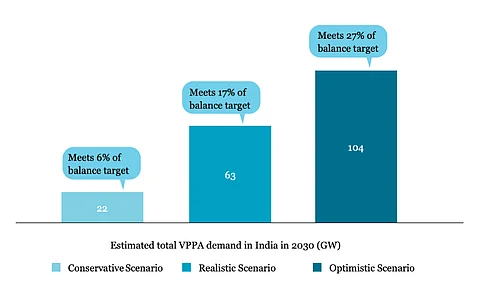

The World Wide Fund for Nature-India (WWF-India) expects total estimated demand for virtual power purchase agreements (VPPA) in India can grow to the tune of 104 GW by 2030 which can help the country meet 27% of its balance target out of 500 GW renewable capacity by 2030.
In its latest report titled Virtual Power Purchase Agreement (VPPA) for C&I consumers in India, the report writers explain that under a conservative scenario, only 22 GW of renewable energy can be realized to meet 6% of the balance target, while in the realistic scenario 63 GW is generated to meet 17% of the balance target. Under its optimistic scenario, 104 GW can be generated to meet 27% of the balance target.
It can be achieved by harnessing the VPPA model for commercial and industrial (C&I) consumers since the current penetration of renewable energy in the total C&I demand is 'poor' despite several corporates exhibiting strong interest in green energy transitioning.
Referring to global corporate giants as Amazon, Google and Microsoft and their use of VPPA to meet their renewable energy targets, WWF-India recommends India too use this popular tool to do the same in a short period of time.
VPPA is a power procurement model wherein under a bilateral contract, a corporate consumer earns green attributes for power the renewable power generator sells in the power exchange. It encourages growth of renewable energy assets while allowing corporate users to source actual electricity from anywhere, including its existing discom. For the latter then there is no loss of a corporate consumer.
"The unique feature of a VPPA is that though it is essentially a financial instrument, yet, it does not interrupt the physical procurement of power. Hence, VPPAs have a strategic advantage because they are not inherently impacted by changing power sector regulations," reads the report.
To encourage and accelerate the adoption of VPPAs in India, the report writers suggest a slew of measures including regulatory compliances to bring the mechanism under the purview of Central Electricity Regulatory Commission (CERC). There should be a clear compliance directive for the developer and the consumer to ensure a single-window clearance for ease of adoption.
According to the report, there should be a standard PPA document that covers all power and financial transactions. The report also bats for facilitating open access for projects under such transactions to make them economically viable.
"Corporate consumers today are facing increasing pressure from stakeholders to 'go green'. The introduction of new and innovative avenues like Virtual Power Purchase Agreements that consolidate demand effectively and are less likely to be impacted by changing regulations will go a long way towards building trust in order for corporates to participate in meeting India's targets," said Secretary-General and CEO of WWF India, Ravi Singh.
The Virtual Power Purchase Agreement (VPPA) for C&I consumers in India report is available for free viewing on WWF-India's website.
